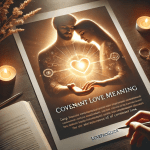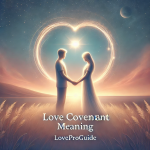Which of the Following Statements About Romantic Love is True? Romantic love is a profound and intricate emotion that has fascinated humans for centuries. Understanding its nuances and dynamics can be a challenging endeavor. Let’s delve into some common questions and theories about romantic love to unravel its true essence and how it manifests in relationships. How to Create Love Between Husband and Wife
What is true romantic love?
True romantic love is an intense emotional connection between partners, characterized by passion, commitment, and intimacy. It involves a deep affection and attachment that often leads to long-term relationships and marriage. True romantic love transcends physical attraction and encompasses a genuine care for each other’s well-being, mutual respect, and a desire to grow together.
Which of the following statements about the course of romantic love between partners over a life span is true?
One statement that holds true about the course of romantic love is that it evolves over time. Initially, romantic love is often marked by passionate and intense feelings. However, as the relationship matures, this intensity may diminish, giving way to a more stable and enduring form of love known as companionate love. This transition is a natural progression and reflects the deepening of emotional bonds and mutual understanding between partners.
What are the three theories of romantic love?
The three prominent theories of romantic love include the triangular theory of love, the attachment theory, and the social exchange theory. The triangular theory, proposed by Robert Sternberg, suggests that love consists of three components: intimacy, passion, and commitment. The attachment theory, developed by John Bowlby, posits that the emotional bonds formed in childhood influence romantic relationships in adulthood. The social exchange theory, on the other hand, views romantic love as a cost-benefit analysis where individuals seek to maximize rewards and minimize costs in their relationships.
What are the two major types of romantic love?

The two major types of romantic love are passionate love and companionate love. Passionate love, often referred to as infatuation, is characterized by intense emotions, sexual attraction, and a strong desire for union with the partner. Companionate love, however, is marked by deep affection, emotional intimacy, and long-term commitment. While passionate love is typically more intense and short-lived, companionate love is stable and enduring, forming the foundation for long-lasting relationships. Types of Love
What are three characteristics of romantic love?
Three key characteristics of romantic love include emotional intensity, exclusivity, and idealization. Emotional intensity refers to the strong feelings of joy, excitement, and sometimes even anxiety that accompany romantic love. Exclusivity denotes the desire to be with one person and to invest in a monogamous relationship. Idealization involves viewing the partner in a positive light, often overlooking their flaws and focusing on their best qualities.
What is the relationship between companionate love and romantic love?

Companionate love and romantic love are interconnected, yet distinct forms of love. Romantic love typically begins with passionate love, characterized by intense emotions and physical attraction. Over time, as the relationship deepens, it often transitions into companionate love, which is built on emotional intimacy, mutual respect, and a strong bond of friendship. This evolution from romantic love to companionate love is crucial for the longevity and stability of a relationship.
At which time during the course of romantic love does a couple experience a decline in marital satisfaction?
Couples often experience a decline in marital satisfaction during the middle years of their marriage. This period, sometimes referred to as the “seven-year itch,” is marked by routine, daily responsibilities, and the challenges of raising children. The initial excitement and novelty of romantic love may wane, leading to a decrease in satisfaction. However, with effort and commitment, couples can navigate this phase and strengthen their bond.
According to Ellen Berscheid, the most important ingredient of romantic love is
passion. Ellen Berscheid, a renowned social psychologist, emphasizes that passion is a critical component of romantic love. Passion encompasses the physical attraction and emotional arousal that partners feel for each other. It is this passion that fuels the initial stages of romantic love and can help maintain the excitement and connection in a relationship over time.
In the context of bisexuality, which of the following statements is true?
In the context of bisexuality, it is true that bisexual individuals can form romantic and sexual attractions to more than one gender. This means that bisexual people have the capacity to experience romantic love with partners of different genders, challenging traditional notions of monogamous and heterosexual relationships. Understanding and respecting the fluidity of bisexuality is essential in fostering inclusive and supportive relationships.
One of the benefits of a good marriage is

increased health and well-being. Research has shown that individuals in healthy, supportive marriages tend to experience better physical and mental health compared to their single or unhappily married counterparts. Good marriages provide emotional support, reduce stress, and promote healthier lifestyles, contributing to overall well-being and longevity. Which of the Following Statements About Romantic Love is True?
Which of the following is another name for romantic love?
Another name for romantic love is “eros.” Eros, originating from Greek mythology, represents the passionate and intense form of love often associated with romance. It embodies the deep emotional and physical attraction that partners feel for each other, forming the foundation of romantic relationships.
Final Word
Which of the Following Statements About Romantic Love is True? Romantic love is a multifaceted emotion that evolves over time, influenced by various factors and theories. Understanding its dynamics and characteristics can help individuals navigate their relationships more effectively, fostering deeper connections and long-term satisfaction. Whether it’s the passionate beginnings or the stable companionship that follows, romantic love remains a central and cherished aspect of human experience. By appreciating its complexities and nurturing its growth, couples can build lasting and fulfilling relationships that stand the test of time.











